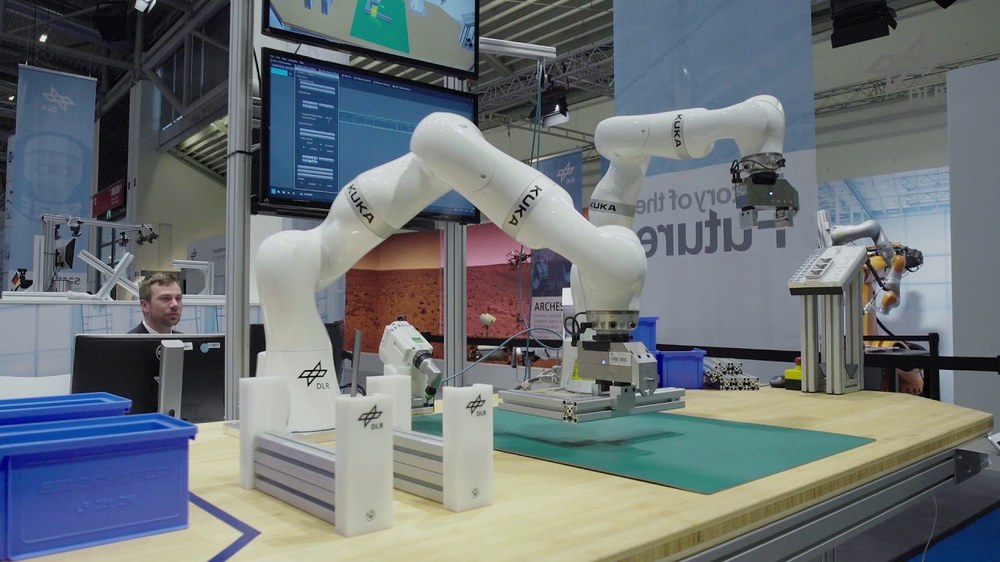Flexible assembly of individual products
Individualized manufacturing and shorter product life cycles are current trends that will significantly change industrial production. Autonomous and cognitive robotic systems are coming to the fore to support the necessary flexibility and mutability for the production of the future: Automated one-off manufacturing will become possible. The vision aims for ease of use and integration: In this context, DLR's Institute of Robotics and Mechatronics is developing robotic assembly systems that, on the one hand, require less expertise on the part of the users, but, on the other hand, are capable of manufacturing complex products and different variants thereof. The aim is to significantly reduce the effort required to implement new tasks. At the same time, the system should make the user's work easier by taking over planning tasks independently. In extreme cases, only the desired end product should be specified by the customer. This can be done, for example, via an interface for intuitive product configuration. Sophisticated planning algorithms then automatically create a sequence of assembly steps.
The institute is researching various planning units and methods for reliable execution. Central to this are the flexibility and degree of autonomy of the robotic systems: an algorithm finds suitable assembly sequences that can be executed by the system. Methods for grasp planning, automatic analysis of reachability in the work cell and collision-free planning of movements make such systems particularly flexible - also with regard to different product variants. Adaptability to new tasks is central. The idea that the robot has capabilities that can be easily reused in different situations is implemented throughout, from planning to execution. In one application example, a robotic system assembles aluminum profiles into complex structures. The system can manufacture different products, which are configured via an easy-to-use tablet interface. The setup consists of two LBR iiwa lightweight robots from KUKA. Their special characteristics enable reliable execution, which is not even affected by uncertainties in the work cell. The integrated force sensor technology makes sensitive assembly possible. DLR is developing methods that exploit these fundamental properties of lightweight robots, for example, to make assembly tasks more robust against uncertainties and to execute them more efficiently.
Video

Your consent to the storage of data ('cookies') is required for the playback of this video on Youtube.com. You can view and change your current data storage settings at any time under privacy.
Publications
- Nottensteiner, Korbinian und Sachtler, Arne und Albu-Schäffer, Alin (2021) Towards Autonomous Robotic Assembly: Using Combined Visual and Tactile Sensing for Adaptive Task Execution. Journal of Intelligent & Robotic Systems, 101 (49). Springer. doi: 10.1007/s10846-020-01303-z. ISSN 0921-0296.
- Rodriguez Brena, Ismael Valentin und Nottensteiner, Korbinian und Leidner, Daniel und Durner, Maximilian und Stulp, Freek und Albu-Schäffer, Alin Olimpiu (2020) Pattern Recognition for Knowledge Transfer in Robotic Assembly Sequence Planning. IEEE Robotics and Automation Letters, 5 (2), Seiten 3666-3673. IEEE - Institute of Electrical and Electronics Engineers. doi: 10.1109/LRA.2020.2979622. ISSN 2377-3766.
- Bachmann, Timo und Nottensteiner, Korbinian und Rodriguez Brena, Ismael Valentin und Stemmer, Andreas und Roa Garzon, Máximo Alejandro (2020) Using Task-Specific Workspace Maps to Plan and Execute Complex Robotic Tasks in a Flexible Multi-Robot Setup. In: 52nd International Symposium on Robotics (scopus), Seiten 161-168. VDE VERLAG GMBH. 52nd International Symposium on Robotics, 9-10 Dec 2020, Munich, Germany. ISBN 978-3-8007-5428-1.
- Rodriguez Brena, Ismael Valentin und Nottensteiner, Korbinian und Leidner, Daniel und Kassecker, Michael und Stulp, Freek und Albu-Schäffer, Alin (2019) Iteratively Refined Feasibility Checks in Robotic Assembly Sequence Planning. IEEE Robotics and Automation Letters. IEEE - Institute of Electrical and Electronics Engineers. doi: 10.1109/LRA.2019.2895845. ISSN 2377-3766.
- Nottensteiner, Korbinian und Bodenmüller, Tim und Kaßecker, Michael und Roa Garzon, Máximo Alejandro und Stemmer, Andreas und Stouraitis, Theodoros und Seidel, Daniel und Thomas, Ulrike (2016) A Complete Automated Chain for Flexible Assembly using Recognition, Planning and Sensor-Based Execution. In: 47th International Symposium on Robotics, ISR 2016. VDE Verlag. 47th International Symposium on Robotics ISR, 21.-22.Juni, München, Deutschland. ISBN 978-3-8007-4231-8.

